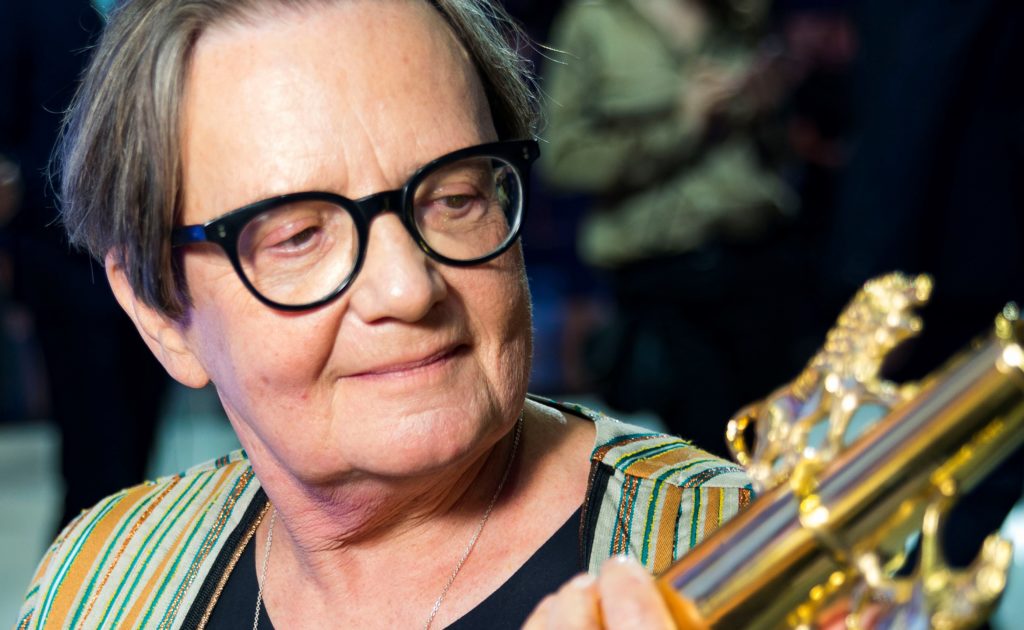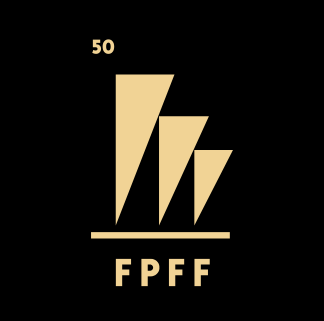Platinum Lions for Agnieszka Holland

This year, Agnieszka Holland will receive the Polish Film Festival award for her lifetime achievement in filmmaking. Both a director and a screenwriter, she will be awarded the Platinum Lions statuette during the closing ceremony of the 46th PFF. Formerly, she was a threefold winner of the Golden Lions for the films: Fever, In Darkness, and Mr Jones.
Platinum Lions are awarded annually by the Organising Committee of the Polish Film Festival to honour the achievements of prominent figures of Polish cinema. The candidacy of Agnieszka Holland was unanimously recommended this year by the Polish Filmmakers Association and the Festival’s Programme Council under the direction of Paweł Pawlikowski.
Agnieszka Holland is indisputably one of the most important figures in the history of Polish cinema, at the same time expanding its boundaries with her artistic personality. She completed her education in Prague and has been successfully executing films in Poland, Czech Republic, France, Germany, and USA. She is a true citizen of the world and one of the most appreciated female creators of the contemporary artistic cinema. Apart from her artistic activities, she has been socially active for years. Recently, she has become the director of the European Film Academy, thus being one of the best ambassadors of the country and Polish art abroad. Awarding such a person the Platinum Lions is certainly a great day for the Polish Film Festival in Gdynia – says Paweł Pawlikowski, the chairman of the Programme Council of the PFF.
Platinum Lions have already been awarded to, among others: Andrzej Wajda, Jerzy Antczak, Sylwester Chęciński, Tadeusz Chmielewski, Tadeusz Konwicki, Janusz Majewski, Roman Polański, Witold Sobociński, Jerzy Wójcik, Jerzy Gruza, Jerzy Skolimowski, and Krzysztof Zannussi. Last year, they were joined by two directors: Andrzej Barański and Feliks Falk.
Among the achievements of this year’s Winner there are more than 40 films and series, executed in Poland, co-produced internationally and in the United States, which have been awarded at festivals and by prestigious film bodies.
Agnieszka Holland was born on 28th November 1948 in Warsaw. In 1971, she graduated Czech FAMU, that is, the Film and TV Faculty of the Academy of Performing Arts in Prague. After she came back to Poland, she was working as the director’s assistant for Krzysztof Zanussi’s film The Illumination (1973). She became involved with Polish film studio Zespół Filmowy “X”, established in 1972, under the artistic direction of Andrzej Wajda.
She debuted as a director with a short film An Evening at Abdon’s (1975), which was aired on television. Her first full-length film was Provincial Actors (1978), recognised as one of the most important films of the Polish cinema of the moral anxiety. This feature received many awards, including the award of the International Federation of Film Critics FIPRESCI at Cannes Film Festival. At that time, Agnieszka Holland wrote the screenplay for Andrzej Wajda’s film Without Anaesthesia (1978), honoured with the Golden Lions at the Polish Film Festival, which at the time took place in Gdansk.
Three years later, the director received her first “own” Golden Lions for the film Fever (1980). The feature constituting an adaptation of Andrzej Strug’s novel The Story of One Bullet argued with the enthusiasm of the solidarity movement of the August in the 80s. The drama directed shortly after, A Lonely Woman (1981), depicting the hopelessness of a single mother’s life in Poland was waiting six years for the official premiere, because it was being delayed and censored by the authorities. In 1988, it won the Special Jury Award at the Festival in Gdynia.
When the martial law was introduced in Poland in 1981, Agnieszka Holland was abroad, where she decided to live as an immigrant. Temporarily living and working in France and the Federal Republic of Germany, she was working, among others, with Andrzej Wajda, on the screenplays for Danton (1982) and Korczak (1990). Her film Angry Harvest (1985), in which she addressed the issue of Holocaust, was nominated for an Oscar for best foreign language film. She also executed an American-French co-production To Kill a Priest (1988), a drama based on the story of priest Jerzy Popiełuszko’s murder.
True story of Solomon Perel, a Jew who joined the German army to avoid extermination, became an inspiration for the film Europa, Europa (1990). It was awarded a Golden Globe for Best Foreign Language Film. Agnieszka Holland’s film was once again nominated for an Oscar, this time for Best Adapted Screenplay.
Agnieszka Holland’s first fully-French film based on her own screenplay was Olivier, Olivier (1991) – a diligent study of a family from province, in which one of the children mysteriously goes missing. In the United States the director realized an adaption of Frances Hodgson Burnett’s classical novel The Secret Garden (1993). Her next American productions included: Total Eclipse (1995) about the relationship between the poets Artur Rimbaud and Paul Verlaine, Washington Square (1997), an adaptation of Harry James’ novel, and The Third miracle (1999), based on Richard Vetere’s novel, in which the director discussed the matter of miracles in the Catholic Church. Among next films realized at that time abroad by the extremely hardworking Polish filmmaker were Julie Walking Home (2002) and Copying Beethoven (2006).
Two decades after the film Europa, Europa, Agnieszka Holland came back to the topic of Holocaust with a war drama In darkness (2011). For this film adaptation of Krystyna Chiger’s book The Girl in the Green Sweater the director received the Golden Lions at the Festival in Gdynia, for the second time in her career, as well as another nomination for an Oscar for Best Foreign Language Film. At the Berlinale, Agnieszka Holland’s film Spoor (2017) had its premiere – an adaptation of Olga Tokarczuk’s novel Drive Your Plow Over the Bones of the Dead, described as an eco-thriller. In Berlin, it won a Silver Bear, and in Gdynia, it won an award for, among others, best direction.
In 2019, the 44th Polish Film Festival brought Agnieszka Holland the third Golden Lions statuette for best Polish film. The director received it for Mr Jones (2019), a story of a Welsh journalist, who was the first to describe the great hunger in Ukraine. In the following year, the director presented her next film, an effect of her work in Czech Republic, Charlatan (2020). This time, she was inspired by the biography of a Czech herbalist and healer Jan Mikolášek.
In 2007, in Poland, Agnieszka Holland directed a political fiction television series, Prime Minister, in cooperation with her sister Magdalena Łazarkiewicz, her daughter Kasia Adamik, and Borys Lankosz. Her next series co-produced with her daughter was the Polish-Czech-Slovakian-Hungarian production Janosik: The True Story (2009). Among her television productions it is important to mention an HBO miniseries Burning Bush (2013). It tells the story of Jan Palach, a Czech student, who set himself on fire in protest against the aggression of the military forces of the Warsaw Pact on Czechoslovakia. In 2018, the first Polish series for Netflix had its premiere, 1983. Agnieszka Holland worked on it with Kasia Adamik, Olga Chajdas, and Agnieszka Smoczyńska. Agnieszka Holland also directed some of the episodes of the American series: The Wire, The Killing, and House of Cards.
Agnieszka Holland was also a theatre director and a Czech translator. She translated Milan Kundera’s The Unbearable Lightness of Being (Polish translation was published in 1985). The artist was awarded, among others, The Knight’s Cross of The Order of Polonia Restituta “for outstanding achievement for Polish culture and educational work” (2001) and the Golden Medal “Gloria Artis” (2008). For “merits in spreading the good name of Czech Republic” she was also awarded the “Gratias Agit” award by the Ministry of Foreign Affairs of Czech Republic. She is also a Doctor Honoris Causa of the Brandeis University in Waltham, Massachusetts, and FAMU in Prague.
In December 2020, Agnieszka Holland became the President of European Film Academy (EFA), taking over the function of a German director, screenwriter and producer Wim Wenders. Formerly, since 2014, she was the head of EFA board. The director gave herself to the public and was an attentive observer of the present and a committed commentator of socio-political life.
Agnieszka Holland will receive Platinum Lions, the award of the Polish Film Festival for the lifetime achievement, on Saturday 25th September 2021 at the awards ceremony of the 46th PFF in Gdynia.
Photo Anna Bobrowska / KFP. The photo was made during the ceremony of the 44th PFF in Gdynia.


